No, you should not put concentrated coolant in your car without diluting it with water. Concentrated coolant is designed to be mixed with water in a 50/50 ratio to provide the best protection for your engine.
Pouring it directly into the radiator without diluting it can lead to overheating and engine damage.
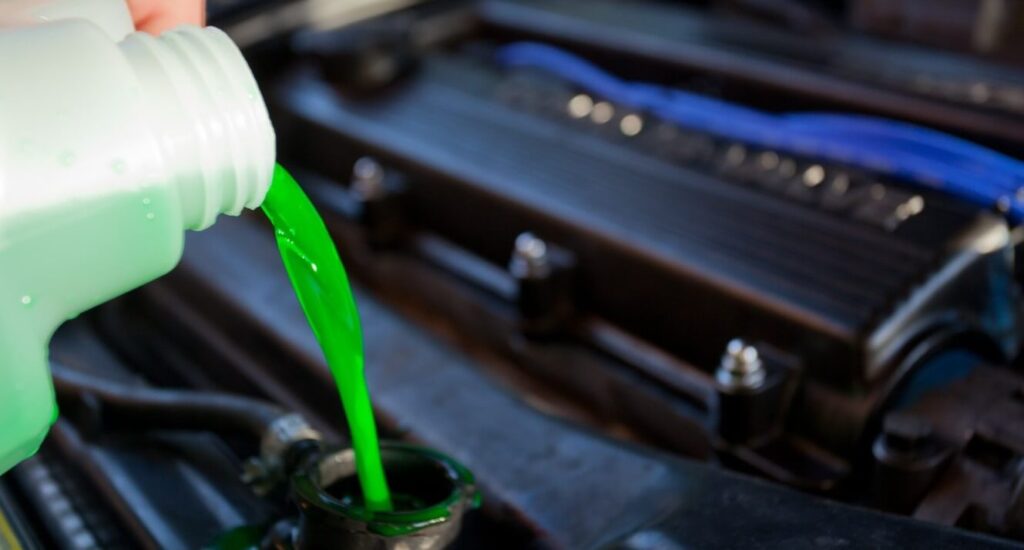
What Is Concentrated Coolant?
Concentrated coolant is a highly efficient coolant that needs to be mixed with water before using it in a car. It helps regulate engine temperature and prevents overheating, ensuring optimal performance and longevity for your vehicle.
Concentrated coolant is a crucial component of a car’s cooling system. It is a mixture of ethylene glycol or propylene glycol, additives, and deionized water. While undiluted, concentrated coolant may not be used directly in a vehicle, it serves as the foundation for creating the coolant mixture that helps regulate the engine’s temperature.
Understanding the definition and composition of concentrated coolant can offer valuable insights into the inner workings of a car’s cooling system.
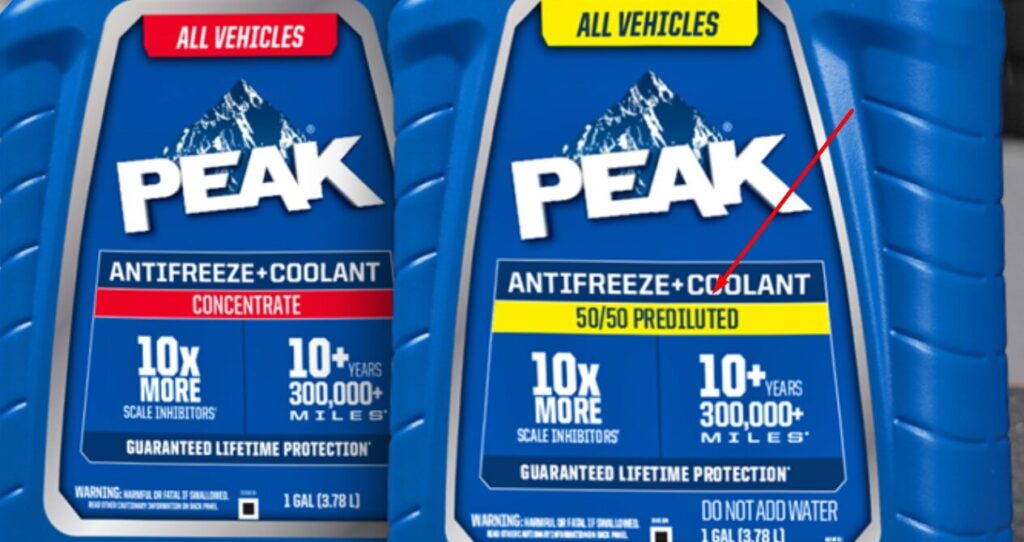
What happens if you put straight coolant concentrate in your car?
Putting straight coolant concentrate in your car can have several negative consequences. Here are some of the most common issues:
- Overheating: Coolant is a mixture of water and ethylene glycol, with the latter being the primary component that prevents freezing. However, ethylene glycol is also less effective at transferring heat than water. Using an undiluted coolant will reduce the overall heat transfer efficiency of the cooling system, increasing the risk of overheating.
- Freezing: While ethylene glycol lowers the freezing point of water, it doesn’t eliminate it altogether. Using undiluted coolant will raise the freezing point of the coolant mixture, making it more susceptible to freezing at cold temperatures.
- Corrosion: Ethylene glycol is slightly acidic, and using it without dilution can lead to corrosion of the engine’s cooling system components, such as the radiator, water pump, and thermostat.
- Reduced lubrication: Coolant also serves as a lubricant for the water pump. Using undiluted coolant can reduce the lubrication properties of the coolant, potentially leading to wear and tear on the water pump.
- Sensor issues: Some coolant level sensors rely on the electrical conductivity of the coolant mixture. Using undiluted coolant can alter the electrical conductivity, potentially causing false readings from the coolant level sensor.
In summary, it is crucial to dilute coolant concentrate with water before using it in your car’s cooling system. The recommended coolant concentration varies depending on the climate, typically ranging from a 30/70 water/coolant ratio for hot climates to a 70/30 water/coolant ratio for cold climates.
Refer to your car’s owner’s manual for the specific coolant recommendations for your vehicle.
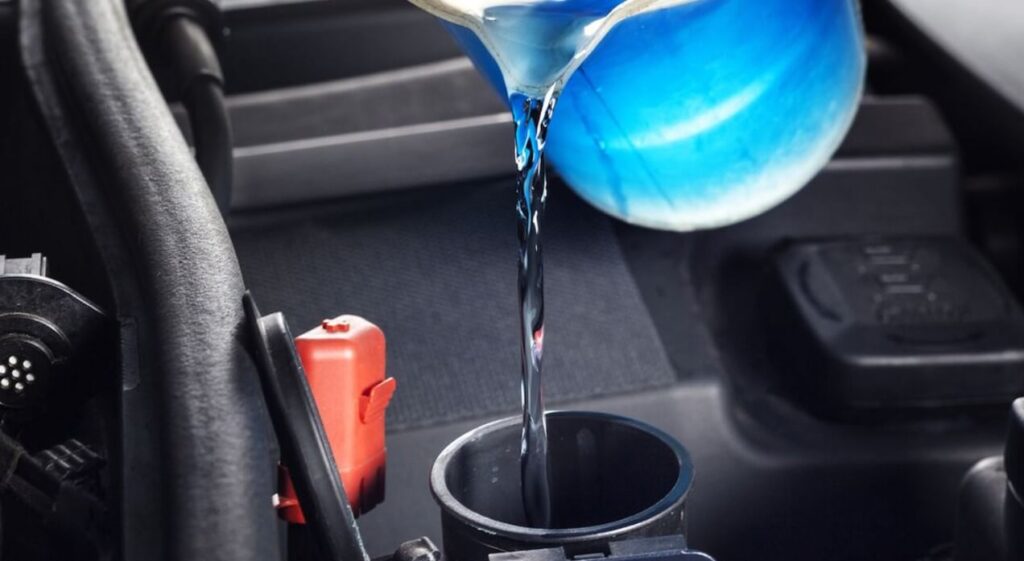
Can you add concentrated coolant?
Certainly! Adding concentrated coolant to a system is a straightforward process. Begin by ensuring the engine is cool and the vehicle is on a level surface. Open the radiator cap carefully, using a rag to protect your hands.
Mix the concentrated coolant with an equal amount of distilled water as per the manufacturer’s recommendations. Slowly pour the mixture into the radiator until it reaches the recommended level.
Be cautious not to overfill. Once done, secure the radiator cap, start the engine, and let it run for a few minutes with the heater on to ensure proper circulation. Check the coolant level again after the engine cools down and add more mixture if necessary.
Regularly monitoring and maintaining the coolant levels is crucial for efficient engine performance and preventing overheating.
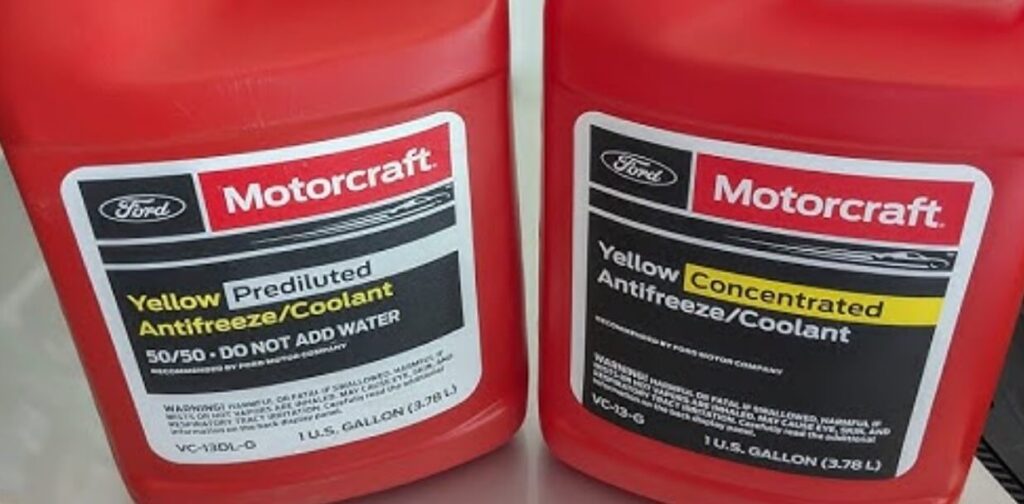
Should I use 50 50 coolant or concentrate?
The decision between using a 50/50 coolant mix or a concentrated coolant depends on your specific needs and the climate in your region. A 50/50 mix of coolant and distilled water is convenient because it’s pre-diluted and ready for use, making it simpler to add to the system.
On the other hand, concentrated coolant allows for customization of the coolant-to-water ratio, which can be beneficial in extreme temperatures.
If you’re in an area with harsh winters, a higher concentration of coolant can provide better freeze protection. In contrast, a higher water ratio in hotter climates enhances heat dissipation.
Always follow the manufacturer’s recommendations and consider the local climate when choosing the appropriate coolant for your vehicle.
How to Dilute Coolant?
Diluting coolant is a straightforward process. Start with the concentrated coolant recommended for your vehicle, and check the manufacturer’s guidelines for the proper coolant-to-water ratio. Typically, this ratio is 50% coolant to 50% distilled water, but it can vary based on climate conditions.
Use a clean container and mix the coolant and distilled water in the specified ratio. For precision, consider using a measuring cup or following any markings on the coolant container.
Thoroughly stir the mixture to ensure even distribution. Once diluted, carefully pour the coolant mixture into the radiator or overflow reservoir. Be sure to follow safety precautions, such as wearing gloves and eye protection, and dispose of any excess coolant responsibly.
Regularly checking and maintaining the coolant levels in your vehicle is crucial for optimal engine performance and temperature regulation.
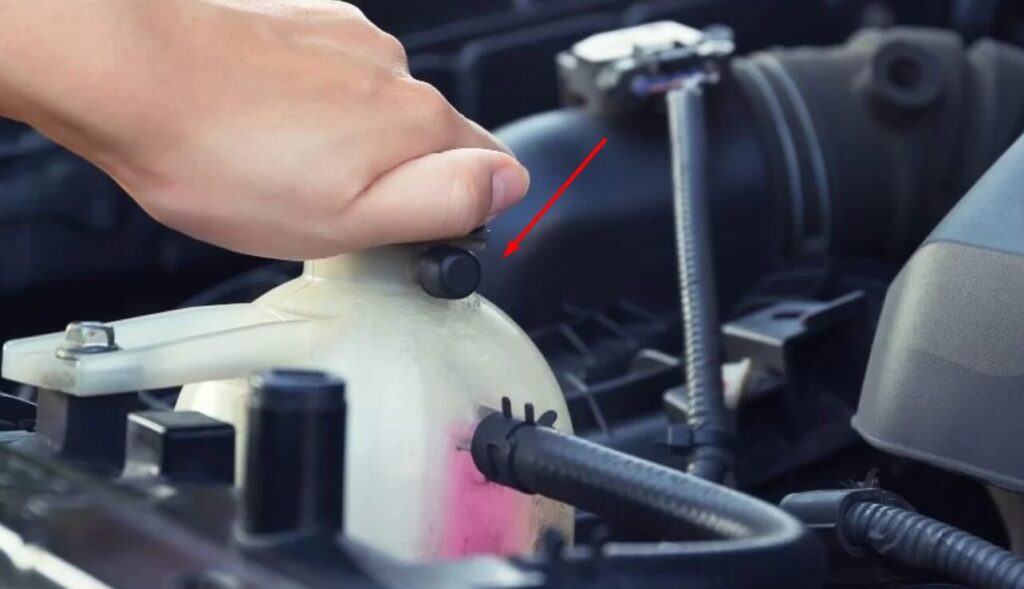
Can you put concentrated antifreeze in your car?
Yes, you can put concentrated antifreeze in your car. Concentrated antifreeze needs to be diluted with distilled water before being added to the cooling system. Check the manufacturer’s recommendations for the proper coolant-to-water ratio, usually around 50% antifreeze to 50% distilled water.
Mixing the antifreeze with water allows for better heat transfer and protection against freezing and overheating.
Use a clean container to blend the antifreeze and water in the specified ratio, stir well, and then pour the mixture into the radiator or overflow reservoir. It’s essential to follow safety guidelines, wear protective gear, and dispose of any excess coolant responsibly.
Regularly monitoring and maintaining the correct coolant levels in your car contributes to efficient engine performance and prevent temperature-related issues.
Importance Of Proper Coolant Levels
Maintaining proper coolant levels is crucial for the optimal performance of your car. However, it is not advisable to put concentrated coolant in your car as it can lead to potential damage and imbalance in the cooling system. Make sure to always use the recommended coolant mixture to ensure the longevity of your vehicle.
Significance Of Maintaining Adequate Coolant Levels
- Proper coolant levels are crucial for maintaining optimal engine performance and preventing overheating.
- Coolant, also known as antifreeze, plays a vital role in regulating engine temperature and preventing freezing in cold weather.
- Maintaining adequate coolant levels helps to lubricate vital engine components, preventing corrosion and excessive wear.
- Coolant also helps in heat transfer, ensuring that your engine stays at an optimal temperature for efficient combustion.
Potential Risks And Consequences Of Low Coolant Levels
- Low coolant levels can lead to engine overheating, which can cause significant damage and the need for costly repairs.
- Overheating can result in warped cylinder heads, blown head gaskets, or even engine seizure.
- Lack of proper coolant levels may cause the engine to malfunction, leading to breakdowns and leaving you stranded.
- In extreme cases, low coolant levels can lead to complete engine failure, requiring a complete replacement.
Effects Of Using Concentrated Coolant Without Dilution
- Using concentrated coolant without dilution can have severe consequences for your engine.
- Concentrated coolant is designed to be mixed with water in recommended proportions for optimum performance.
- If used without dilution, concentrated coolant can have insufficient cooling properties, leading to overheating.
- It can also cause cooling system blockages due to the lack of water as a carrier.
- Using concentrated coolant without dilution can result in corrosion and damage to vital engine components.
- The potential risks associated with using concentrated coolant without dilution outweigh any potential benefits.
Remember, maintaining proper coolant levels in your car is essential for the longevity and performance of your engine. Regularly checking the coolant levels and ensuring the correct mixture of coolant and water will help protect your vehicle from overheating and costly repairs in the long run.
The Difference Between Concentrated And Pre-Mixed Coolant
Concentrated coolant should not be put directly into a car’s cooling system. It needs to be mixed with the appropriate amount of water first to ensure proper performance and protection for the engine.
Comparison Of Concentrated Coolant And Pre-Mixed Coolant:
Concentrated Coolant:
- Concentrated coolant is a coolant product that requires dilution with water before being added to the car’s cooling system.
- Typically, concentrated coolant comes in a higher concentration of antifreeze and coolant additives.
- It is usually available in larger containers and is more cost-effective in the long run.
- The specific coolant-to-water ratio for dilution depends on the manufacturer’s instructions.
Pre-Mixed Coolant:
- Pre-mixed coolant, as the name suggests, is ready to use without any further dilution required.
- It is a mixture of antifreeze and water in the appropriate ratio, making it convenient for direct use.
- Pre-mixed coolant usually comes in smaller containers and is priced slightly higher than concentrated coolant.
- The ratio of antifreeze to water in pre-mixed coolant is already determined by the manufacturer.
Advantages And Disadvantages Of Each Type:
Concentrated Coolant:
Advantages:
Cost-effective: Buying concentrated coolant allows you to save money as you can dilute it with water at the appropriate ratio before use.
Versatile: Concentrated coolant gives you control over the coolant-to-water ratio, making it suitable for different climates and operating conditions.
Long shelf life: Unlike pre-mixed coolant, concentrated coolant has a longer shelf life because it doesn’t contain water.
Disadvantages:
Mixing required: Diluting concentrated coolant can be time-consuming and may require additional containers and tools.
Dilution mistakes: There is a possibility of making dilution errors, which can affect the cooling system’s performance and potentially damage the engine if not done correctly.
Inconvenience for some: Not everyone feels comfortable mixing the coolant themselves, especially if they lack confidence in their automotive knowledge.
Pre-Mixed Coolant:
Advantages:
Convenience: Pre-mixed coolant is ready to use, eliminating the need for mixing and ensuring the correct coolant-to-water ratio.
Ease of use: Since it’s already mixed, pre-mixed coolant can be directly poured into the cooling system without any further preparation.
Reduces dilution errors: Using pre-mixed coolant significantly reduces the risk of making dilution mistakes.
Disadvantages:
Higher cost: Pre-mixed coolant is typically more expensive than concentrated coolant due to the convenience factor.
Limited customizability: With pre-mixed coolant, you have less control over the coolant-to-water ratio, which may not suit extreme weather conditions.
Limited shelf life: Pre-mixed coolant has a shorter shelf life compared to concentrated coolant because it contains water.
Accidentally put concentrated coolant
If you accidentally put concentrated coolant into your vehicle’s cooling system without diluting it with water, it can lead to potential issues. Concentrated coolant is designed to be mixed with water before being added to the radiator. Here’s a brief explanation:
- Insufficient Cooling: Using concentrated coolant without dilution reduces its ability to effectively transfer heat from the engine. This can result in inadequate cooling and potential overheating.
- Freezing Risk: Concentrated coolant alone has a lower freezing point than when mixed with water. This can be a concern in colder temperatures, as the undiluted coolant may not provide sufficient protection against freezing.
- Reduced Heat Transfer: The cooling system’s efficiency in dissipating heat is compromised when concentrated coolant is not diluted. This can lead to higher operating temperatures, affecting engine performance and potentially causing damage.
If you’ve added concentrated coolant without diluting it, it’s important to correct the mixture by adding the appropriate amount of water. Refer to your vehicle’s owner’s manual or the coolant product instructions for the recommended coolant-to-water ratio.
If the cooling system is already filled, you may need to drain some of the coolant and add the proper mixture to achieve the correct concentration.
Always follow the manufacturer’s guidelines to ensure the optimal performance of your vehicle’s cooling system.
FAQs: Can I Put Concentrated Coolant In My Car?
Can Concentrated Coolant Damage My Car Engine?
Concentrated coolant can potentially cause damage to your car engine. A higher concentration of coolant can lead to inadequate heat transfer and poor lubrication, causing overheating and engine failure. It’s important to follow the manufacturer’s recommended coolant mixing ratios to ensure optimal performance and longevity of your engine.
How Do I Mix Concentrated Coolant For My Car?
To mix concentrated coolant for your car, follow the instructions provided by the manufacturer. Usually, you will need to dilute the concentrate with a specific ratio of water. The recommended mixing ratio can vary depending on the type of coolant and your car’s specifications. Mixing coolant correctly ensures proper cooling, corrosion protection, and optimal performance for your vehicle.
Can I Use Straight Concentrated Coolant Instead Of Premixed Coolant?
Using straight concentrated coolant without diluting it can lead to cooling system issues and potential engine damage. Concentrated coolant needs to be mixed with a specific ratio of water to provide adequate heat transfer and corrosion protection. It’s crucial to follow the manufacturer’s recommendations and use the appropriate coolant mixture to ensure the proper functioning of your car’s cooling system.
Conclusion
Based on the information provided in this blog post, it is clear that using concentrated coolant in your car is not recommended. While it may be tempting to use a more concentrated solution to save money or reduce the frequency of coolant changes, it can actually be detrimental to your vehicle’s performance and longevity.
Concentrated coolant can lead to issues such as coolant system corrosion, decreased heat transfer, and engine damage. It’s essential to follow the manufacturer’s recommended coolant specifications and ratios to ensure optimal performance and temperature regulation.
Regularly checking your coolant levels and quality, and performing coolant flushes according to the recommended schedule, can help prevent costly repairs down the line.
By taking proper care of your car’s coolant system, you can ensure a smooth and efficient driving experience for years to come.
